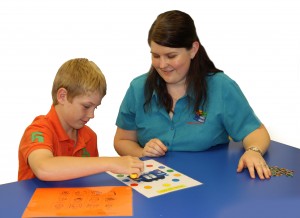
Auditory memory is the ability to hold in your memory, in correct sequence, things you hear, long enough to process the information. Children who have difficulty with auditory memory have difficulty with following instructions, recalling and retaining information, learning new concepts and understanding what is read to them. They often have difficulty developing literacy skills.
Some strategies for older children include helping your child learn to:
1. Stop, look and listen when given information or instructions.
2. Check their own understanding of what is said and ask for clarification or help if needed.
3. Rehearse instructions by repeating what is said over a few times before beginning.
4. Identify key words in information and remember these by repeating them over a few times.
5. Use note taking to record key words.
6. Use association to help with recall e.g. do your teeth and hair, then pack your drink and lunch, you might associate “bathroom - teeth and hair, kitchen - drink and lunch”
7. Chunk information into groups, “teeth and hair”, then “shoes, hat, coat”.
8. Use movement patterns to help recall, e.g. say the things you need to remember as you count them on your fingers. Do this a couple of times then repeat it as you do each item.
9. Have a buddy that you can ask for help if needed.
10. Use lists, planners and dairies. Make use of technology such as reminder functions on phones.
Your child will need to practice these techniques before being able to use them in daily activities. Here are some ideas for practising the techniques. Start simple and gradually make the tasks more difficult as your child progresses.
1. Scavenger hunt. Give your child a piece of paper and a pen and ask them to find 5 to 10 things from around the house. Tell them what you want and where to find it and encourage them to take notes to help them remember. As you practice increase the number of things and the details they need to remember e.g. find the blue hat, and the biggest pair of scissors.
2. Keywords. Some children find it hard to work out what words are the most important from the information presented. You can help with this by looking at a paragraph of writing from a book and asking your child to read and note down the most important words, then put the book away and retell the information from the notes they have written. Once they can pick out the most useful key words,read a paragraph to them and ask them to make notes as you read then tell the information back from their notes. Ask some questions and see if they can answer those using their notes.
3. Find it. Put a range of picture cards in front of your child, or use a page from an “eye spy” type book. Choose an item and give your child three clues about your item. Encourage your child to verbally rehearse by repeating the clues over a number of times then trying to find the item that fits the clues. You can also practice chunking, association and motor patterns by giving your child a list of things to find.
4. Guess who. Use the classic Guess Who game but rather than taking turns and asking questions, give three or four clues “I have blue eyes, red hair and a moustache” and see if you child can repeat the clues a number of times then find the face that matches. You can repeat this activity using pictures of animals, or even objects around the room.
5. Barrier games. Use these to practice strategies such as note taking. Rather than giving the instructions one at a time the speaker can give a series of four or five instructions, with the listener taking notes, then arranging their items from their notes.
6. Find your way. Use google maps to find a map of a place familiar to your child such as your local area. Print two copies. On one copy mark a route from one place to another. Give your child instructions and encourage them to use their strategies to remember the instructions and follow the route on the second map. Do they arrive at the right destination?
7. Be a reporter. Ask your child to interview another family member about a topic such as what they did that day. Use their note taking skills to record what is said then “report” back what they have learned using their notes. To make it fun use a camera to record the report.
If you are concerned about your child’s ability to listen or understand a speech pathology assessment can tell you how your child compares to others of the same age and give you specific ideas on developing your child’s skills. For more information browse our website.
Have fun developing your child’s memory skills.
Related Blog Posts
If you liked this post you may also like:
About dyslexia
Using PICTIONARY to Grow
Best of 2015!
Eye hand coordination



